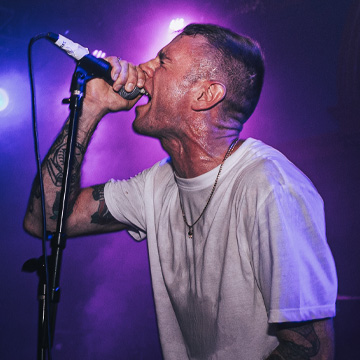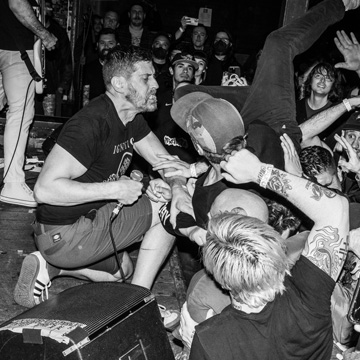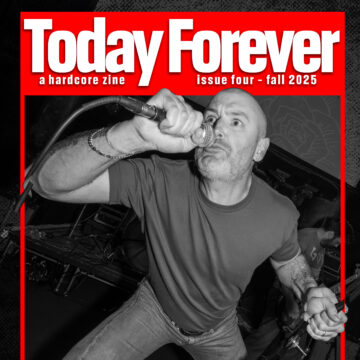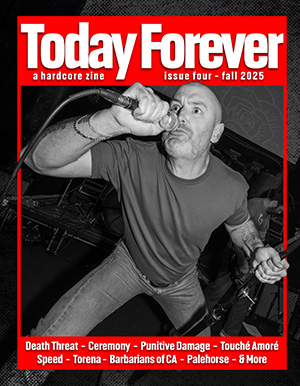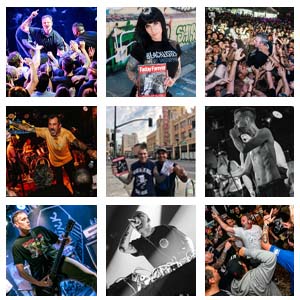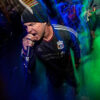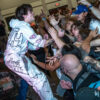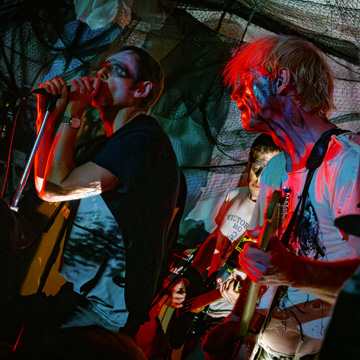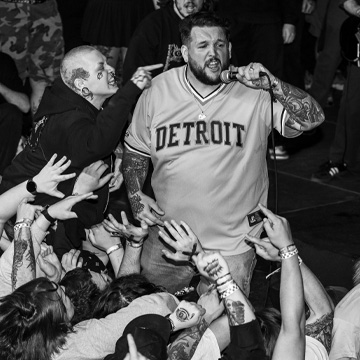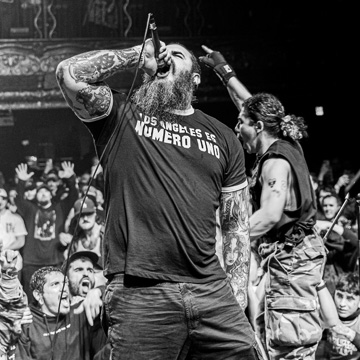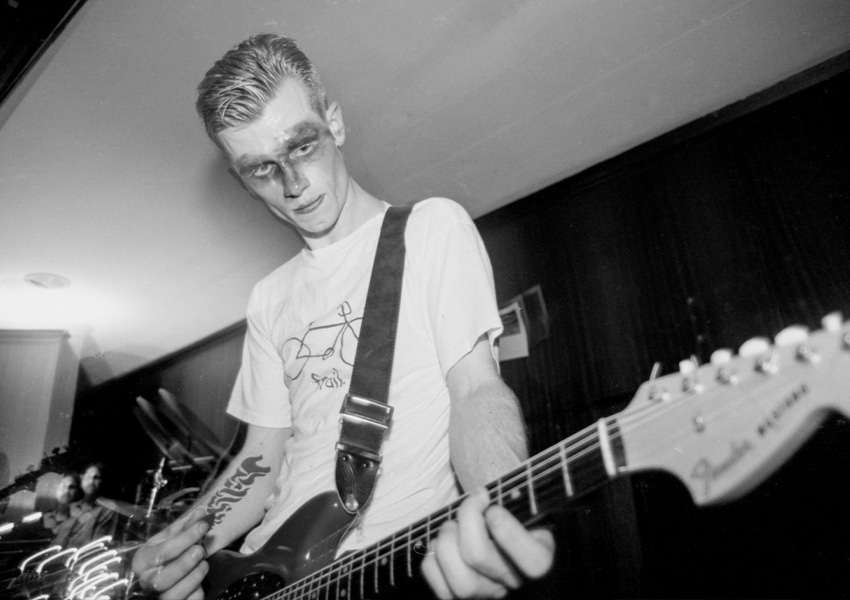
“Devil children…the time has come.” By way of a billboard announcement poised high above one of the busiest freeways in Philadelphia, The Philadelphia Society of Future Vampires has called its members to order with a cryptic announcement that hailed the Halloween homecoming of the mighty Ink & Dagger.
“To this day, to be in The Philadelphia Society of Future Vampires, all you have to do is self-proclaim it,” reveals Don Devore, Philadelphia hardcore legend and founding member of the ground breaking and highly influential 1990s hardcore band. “That was our gang, our club,” recalls Don. “We wanted to be direct and spiritually confrontational. It wasn’t just wanting to be a pain in the ass, it was [an effort] to tempt and lure people into the prospect of really finding themselves and true expression and really going for it.” And that is what the Society demands, simply that its members dive headlong into self expression and open themselves up to their own creative truths. The Society’s only rule is that there are no rules.
Formed by Don Devore and Sean McCabe in the mid 1990s, Ink & Dagger were, from the very beginning, on a mission to provoke, evoke, create, and disrupt. “We were in this world where a lot of things seemed to have a hard time being expressive and seemed very homogenized. We would call everyone a ‘parent’s wet dream,’ all these straight edge kids at the time.” So Sean and Don decide to cut a new groove. While Sean’s tragic passing in 2000 halted the band’s trajectory, Ink & Dagger and their message of self realization and creative empowerment remains as current today as it has ever been.
In recent years, Don, with help from friend and fellow musician Evan Weiss, connected with Trust Records, a label with an incredible track record of cataloging and paying appropriate tribute to seminal punk and hardcore discographies, to undertake the painstaking process of remastering and rereleasing four albums from the band’s prolific catalog. Along with the albums, there is also a 226 page companion book, titled “The Almighty,” by Philadelphia author Erik Bader (available only in the box set) documenting the band’s history through previously unseen flyers, photos, memorabilia, and selected writings from Sean McCabe, with particular attention paid to honoring his brilliant and unique voice.
To celebrate this milestone moment, The Society of Philadelphia Future Vampires presents… The Order. The last week of October marks a full circle moment for Ink & Dagger, as the band returns home to Philadelphia not only for four shows each supported by other incredible Philadelphia bands (Paint It Black, Deadguy, Soul Glo, and Honey each playing one of the nights), but for a full week of events celebrating the band and community. There will be a reading at Launderette Records (Saturday, November 1st) by Erik Bader, and the unveiling of a permanent, city-sponsored mural by Philadelphia artist Steve Powers (ESPO) in partnership with Mural Arts Philadelphia that will pay permanent tribute to Sean McCabe, giving him a permanent place in the city whose wild, chaotic, creative, and unapologetic commitment to freedom is reflected in everything that Ink & Dagger has done.
“[This is] for Philadelphia. It’s for our community as much as it’s for anyone individually, including me or anyone else in the band,” remarks Don of the week they have so painstakingly planned. “There’s a respect and a focus to The Order and this week of events that is one hundred percent. It’s not preparing for something else. It’s not testing the waters. It’s here and now.” Much like everything Ink & Dagger have ever done.
As a long time fan of Ink & Dagger, inspired by their willingness to reject convention, even within subculture, and not only blaze new trails but invite along anyone else willing to go with them, it was an honor to speak with Don Devore as he reflected on his time in the band, his friendship with Sean McCabe, and the journey of paying proper respect to Ink & Dagger. I hope you enjoy reading the interview as much as I enjoyed bringing it to you, and I look forward to seeing some of my fellow members of The Philadelphia Society of Future Vampires in Philadelphia later this week.
Photos by Robby Redcheeks and Neighbor – IG:@naybeez
Ink & Dagger – Trust Records Catalog
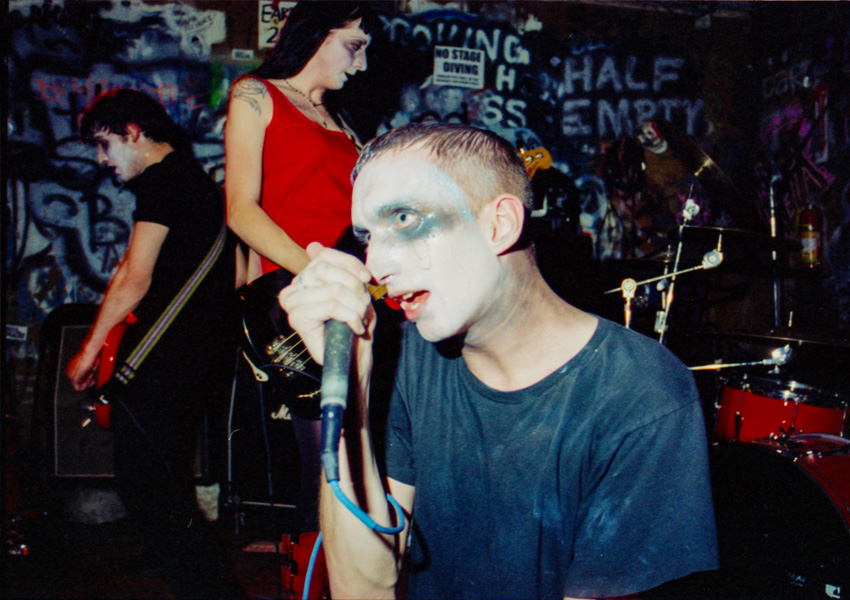
Nikki: Let’s start at the beginning, you and Sean formed Ink & Dagger on the heels of the Mandela Strikeforce. Can you tell me exactly how Ink & Dagger came into being – was it an evolution of The Mandela Strikeforce, or was it something separate and intentional that you wanted to be totally new and different?
Don: Yeah, it was very intentional. I have never started a project off the get when it was more intentional [than Ink & Dagger]. It really started with one of my first bands, Frail. At the end of the last year of that band, Sean was with us everywhere. I always knew, like, what band are we going to start that Sean was going to be in? Because, obviously, that was going to be a thing.
A lot of the metaphors that Ink & Dagger used came out of Frail, ideas of self-realization, self-empowerment, the whole idea of “make your own noise,” that bit of Frail, is really wrapped up in The Philadelphia Society of Future Vampires. It’s just a different way of presenting it. It’s like that, mixed with the modern positive mental attitude, PMA. [It’s] just a new way to look at it.
Sean and I spent countless nights talking about ways to present things, [we thought about] the general feeling of hi-jinx and the Philly hustle, the idea of being authentic and original and novel. It was punk. That’s where it came from. We were in this world where a lot of things seemed to have a hard time being expressive and seemed very homogenized. We would call everyone a “parent’s wet dream,” all of these straight edge kids at the time. We were proportionately into things like Sid Vicious and punk shit and Dead Kennedys, and we wanted to mix that up in the way we were presenting things. We wanted to be direct and spiritually confrontational. It wasn’t just wanting to be a pain in the ass, it was [an effort] to tempt and lure people into the prospect of really finding themselves and true expression, and really going for it.
[After Frail] I started a band called Switched On (which was a Stereolab reference even then), and we played a couple of shows. That lasted for a short while, and then we were doing Mandela Strikeforce, and it all culminated in Ink & Dagger. So it wasn’t long before Frail was done and things turned into Ink & Dagger.
Even our very first show was very well attended. People were ready to go and we were full steam into [Ink & Dagger]. Even now, but especially then, it was “weird” to present yourself in any kind of novel way that isn’t the standard issue of what everyone was comfortable with. People get really uneasy, but it was that sort of uneasiness that is exactly what we were after.
Why the theatrics? From the very beginning, Ink & Dagger had the vampire theme and was very theatrical and performance oriented. It was never “just” music, it was an entire performance. What prompted that decision?
To have the whole experience. It always mesmerized me that you could present as this band and the experience in the room was not even thought of. The mere fact of turning the lights off was so novel. Our whole world was lights on, because a lot of the time that (turning off the lights) was perceived as being “rock and roll,” or coming out of an ego – the idea of having a “stage show” – but ours was strictly not that. It was a way of delivering music that included the visual, as well. It was intended to be an immersive experience.
There’s lots of things we worked out within that. If you’re going to do some kind of antic that includes 150 or 200 people [at a show], like people hiding in the corners [or] covering people in blood [you had to]. If there were 150 people [at a show], we [tried to] work out, “how can we get 145 of them soaked in blood and not totally get beat up?” There’s ways to do that. If we hit people with the blood and didn’t start right away, we probably would’ve gotten beat up. But there’s a power once you start playing, you’re safe. The part that gave the impact we were looking for was that it was premeditated as fuck.
Anyone who ever thought, “oh, you guys really think you’re vampires?” didn’t get it. We weren’t going be like, here’s our answers as to why we’re not vampires, we just wouldn’t say anything. Most reasonable people knew it was a metaphor.
Let’s talk about the metaphor, who came up with that?
That was like our gang, our club. To this very day, to be in The Philadelphia Society of Future Vampires all you have to do is self-proclaim it. Now, that being said, we had a PO Box where we would get applications. Part of the 226 page book that just came out in the box set really dives into that, but at the end of the day it’s just a method for self empowerment that by design has no rules. It’s silly to think that there’s any kind of perceived way that you’re supposed to live or act. It is literally a self-realization, self empowering, expression tool that we used.
The Philadelphia Society of Future Vampires is as current as it’s ever been, there’s no nostalgia involved in it. Last month, The Philadelphia Society of Future Vampires billboard in Philly was really an ode to that. It didn’t say Ink & Dagger, it didn’t say Trust Records, it was very important that it was just for that.
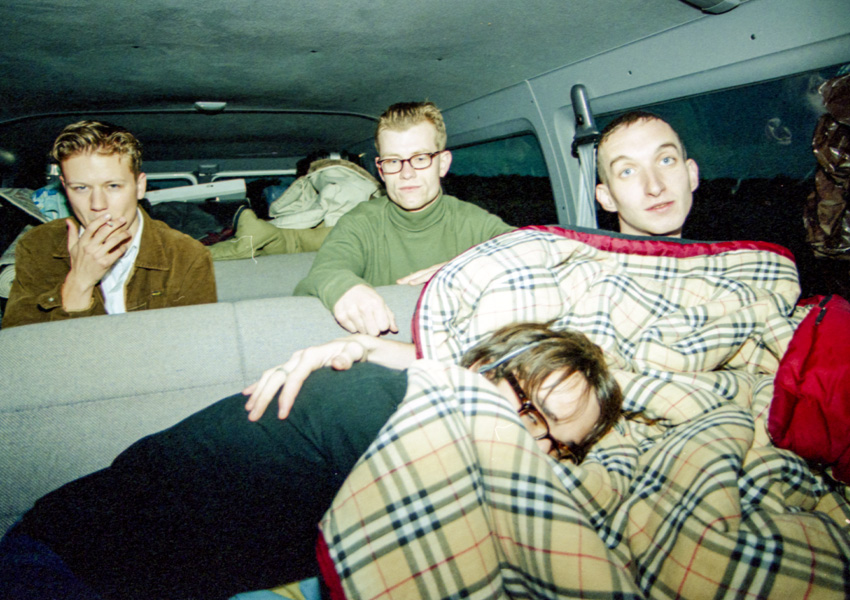
Where did the idea for the billboard come from and how did you make it happen?
You know how you have a dream and might see some old friends in the dream? I’m not saying like they told you in a dream, but you sort of start thinking in the manner that you would if you were around those people anyway, even though it’s in a dream? That’s sort of what inspired the last way to punk the internet, kind of hanging out with Sean in a sense in a dream. I knew I didn’t want to announce it on the internet at all, and one way to do that was to put up the ode to The Philadelphia Society of Future Vampires and not mention anything else. Just let it only be for that. Anyone who knows will know, and a a few days later we’ll give it up. I actually said people will make pilgrimages there and now there’s hundreds of pictures of it.
I just knew the last way to punk the internet was to not use it. Go as big physical media, old school, as possible, and watch how powerful it still is. Watch how it will turn the internet on itself because people just have to know. I knew from the first meeting I had with Trust, when they came into the picture a couple of years ago. That billboard [location] is [for] the Eagles, the Phillies, Jacoby and Meyers, these top dogs. We have no business being where it is. You couldn’t be any more top dog Philly, which was another component. And it was expensive, but fully worth it. The messages I’ve been getting all month and seeing people go there just to take pictures with it, is really wonderful.
I had to scrape quite a bit and convince a lot of people of a lot of things for the entire way we did the roll out, but I knew I wanted to do that. The whole situation has been met with so little cynicism, and I think a lot of that has to do with the roll out and it being as much about the city and as much about The Philadelphia Society of Future vampires as it could ever be about me or anybody else.
Ink & Dagger pulls from a wide variety of influences from indie to electronic to shoegaze and more along with punk and hardcore. At a time where it seems like everyone was picking a lane, you decided to break the mold and pave your own path. What kind of reception did you get from the hardcore scene in the 90s as a band that unapologetically didn’t conform?
There was a lot of kickback, but our first shows had hundreds of people at them and were fucking awesome. We were never wavering in the slightest, it never felt weird or strange to us. We were met with great people, the people that were down were so enthusiastic, and that was so important. It wasn’t easy to go around the country for a month and play to seventeen people in a basement in Minneapolis and fully do our thing, but it was so natural.
I remember playing this one show in San Francisco. I’m on stage fucking with my chords and I look up and I see this star belt that I recognize, it’s Jello Biafra. It was just Sean and I, and we looked up and he was like, “You guys are like psychedelic hardcore, but what’s up with the vampire shit?” So, I’m sitting there on the Gilman Street stage explaining to Jello Biafra the whole thing, and he was like, “Oh, that’s cool. Do you want to do a record on my label?”
A lot of people would kinda get mad because they’d really like the music but would be so thrown by the metaphor, and then you’d have people who were into it because they really thought we thought we were vampires or something. It was like people wanted to believe we believed that. So, you would see a lot of back and forth like that, but once we started establishing our relationships and doing our thing, it wasn’t hard. We did stop with the makeup at one point, but the message was always the same with or without makeup. It had nothing to do with it. The ethos and energy of the band, we had a very clear plight about what we were trying to say and how we were trying to get it across.
There were still a lot of people who weren’t totally comfortable being themselves [at the time], and a lot of the punk and hardcore world then felt so homogenized. It was a lot of “here we go again.” There’s also a whole other element to all of this, which is that any kind of role you’re making [for yourself] is disqualifying you, and any kind of preaching is to the converted already.
Our dividing line wasn’t how are we going to operate within the art and punk scene, but it was how are we going to operate within art, period. It was incredibly spirited and revolutionary to our personal existences as artists and [our] ways perceived things, but it came with plenty of adverse conditions. People naturally wanted to not like it. That’s a really hard way to start your band. Let’s put this huge check against us when we start, so half the people hate us before they [even] hear us, but I think all great art has to walk a fine line, and any moment could fall to one side and be totally corny and not cool. But, in the right lane perfectly, it can be brilliant. Art needs to have a chance to totally fall on its face to be amazing.
Around the time of the first LP you stopped using as much makeup and some of the visual elements, but maintained the vampire theme in a metaphorical and figurative way. What prompted that shift?
That was probably the most offensive thing about the band, having stale and crusted make up everywhere.
We still did from time to time, we reserved the right, but as soon as people basically started expecting it in a heavy way, [we stopped.] We were rehearsing dozens of hours every week and doing this crazy music, and we were going to switch it up. We would go back here and there, but getting comfortable NOT wearing it was a part of our growth, too. We didn’t want to be a slave to everyone’s perception of what we were supposed to be. As soon as that vibe came, it wasn’t hard to change, but still once in a while we would [still appear in makeup].
There is a certain method of getting into that character, that lets you bring it in a particular way. I start feeling like a Greg Ginn-like superhero or something, which really gives you an extra push, you might say. It definitely allowed for people to get really energetic about being the self-described Society of Future Vampires.
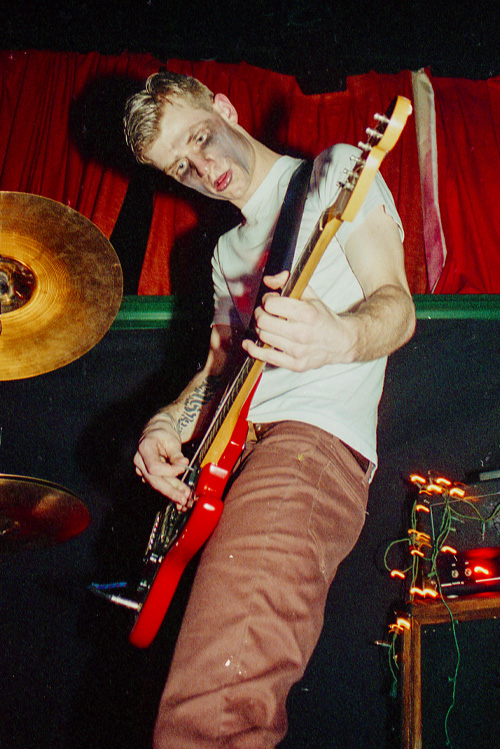
So much of what you do isn’t just music or just visuals, it’s an all encompassing work of art.
Yeah, and it’s a lifestyle and a commitment. The Philadelphia Society of Future Vampires is like the modern PMA to me.
I remember having Dead Kennedys tapes, or the Cramps, or even Throbbing Gristle, and the things we were really excited by were always pushing some kind of limit, to the point of feeling a little uncomfortable. That’s a great place to have people to be able to open them up. [It’s about] trying to open people up in a room, even if it’s in an almost aggressive way, in order to get in and create a back and forth situation with people attending your performance.
Frail was all about “make your own noise,” the interaction between the scene and people attending [shows], and [that] was no different. It’s all just another way to bring everybody in. And, [with Ink & Dagger], it didn’t take long for people to show up wearing their own makeup.
Ink & Dagger became a catalyst for expression, and created spaces where people were free to be whoever they wanted to be and join in. Did you see that immediately at shows?
Totally. Instantly. We had these really huge shows at the [First Unitarian] Church, or wherever, in Philly and kids would take trains in from places like Minneapolis, kids from the crust world, raver kids, jock-y hardcore kids, indie kids. It was very welcoming for everybody.
I was always really proud that our shows would draw from squatter punk kids and indie kids and raver kids. Everyone would come and kind of wig out at the Ink & Dagger show and feel included. I think people were able to feel included because it wasn’t drawing on anything in particular, we didn’t just represent this microcosm of [another] microcosm.
I read somewhere that Sean had once said he’d like to unite the scene, that he felt that was really important to unite the scene at a time when there were so many different things happening (in subculture) that were sometimes even a little combative with each other. Was that something you were trying to do?
Our idea of the scene included everyone, not just the “punk” scene. That’s how we were, I’d feel as comfortable at a hardcore show as I would at some 5000 person early OG rave, it was all a part of this exciting thing called art. Pushing that was the agenda.
How did Ink & Dagger spread the word and immediately have 200 people at your very first shows? How did you get it out there?
That really came out of how involved we already were in the scene in Philly, and that we were already doing bands and living in this sort of classic communal, “Real World” style house. House shows were the first couple, I believe, but they would be packed and that literally was from our own connections to everything and the people around us. It was pretty anticipated from the get.
It’s [also] really convenient [to be] in Philly. New York is 99 miles away, Baltimore is the same distance in another direction. There’s DC. You can have a pretty wide web. And we were mad involved in things. I had booked dozens of shows by then. The First Unitarian Church [in Philly] was like our home and we lived a block from it. It was kind of our stomping grounds.
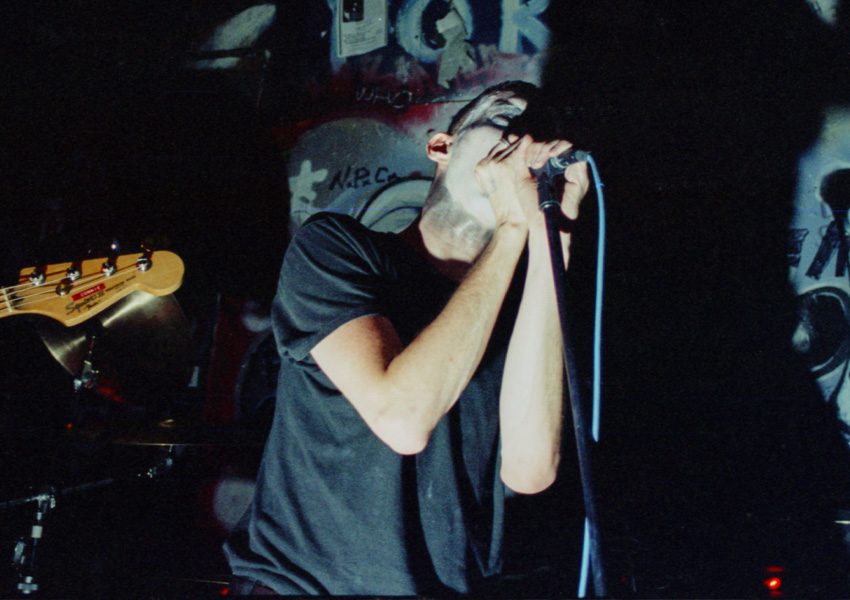
It always felt like In & Dagger were giving people permission to express themselves, which was somewhat unusual at the time, did you feel people were gravitating to that?
Yeah, that was huge. That was the part that allowed people not to feel alienated coming [to our shows] from any background. The whole thing is to “do you” and if [you] tried to do anything else, that’s would be looked at as weird.
We certainly never felt exclusive to this [scene or that]. There were a lot of creative people who went on to do amazing things all around us and it was a really fascinating time. As the band went on for a few years, there were equally proportionately cool things going on [around us] that would fall into the lane of no lane and pushing forward. Whether we were in Belgium or California or Vancouver, we were doing a very similar thing the whole time as far as our commitment to connecting with people through that energy.
Regarding the music, did you and Sean pretty much write everything together?
I wrote all the music and he wrote all the lyrics. The book [included in the Trust Records box set] shows this, but I have some notebooks [of Sean’s]. [There] would be the lyrics and then, in small print, for another ten pages, an explanation of the song. And then, literally, a sermon about the song. Each song, every song, incredible amounts of writing. That was all tied in to what we were doing with the Society of Future Vampires.
You were both really living this whole “Society of Future Vampires” ethos, it was so much more than just music.
We were, and I still am more than ever. It’s almost like a guide toward life as much as something you just declare in a moment in time. Getting inspired is hard, but it’s what we’re always after as artists, and pushing that is mostly up to you, so always try to push that.
What was inspiring the two of you when you were writing? Did lyrics come first? Was he poetic and then you put music to it? What was your process?
Sean never had a lack of lyrics. He would write something and then we’d go in his room for a couple of hours and talk about it. It was such an ideal, storybook way to actually work on something with your best friends. To actually authentically get into it and figure out how it reflects what you’re doing and what you’re trying to say.
I definitely would see things before I wrote [music] from time to time, but we also had this very perfect relationship of having what you need as you move forward, and letting it self-inspire things.
We had one of the sort of early punk love songs, “Lady Love.” The lyrical approach, Sean was a brilliant writer I found, the way words resonate with people we all know is a big deal, and there’s something really special in Sean’s words that allowed people to be there and get into that, and feel that maybe vampires might really be on the loose tonight and you should watch the fuck out.
Let’s talk about the last album, released in 2000 on Buddyhead. It was definitely a bit of a departure from where the band began, and when it was released it was mired by Sean’s passing and other turbulence. Looking back 25 years later do you think that album got the reception it deserved?
Absolutely not. I’m really excited because with the Trust reissues, everything has been remastered, and the original mastering on that album has bugged me since the beginning. So being able to fix that, it’s sounds proper now. That was something that really made it hard for people to get into it at the time, you turned it up and it was literally a little bit annoying sounding. Now that’s all fixed.
That album is wild. If I was to sit there and listen to it, I felt like I was Coltrane making the last record and I was going to die making it. It was really involved musically. Josh, our bass player at the time, sings a bunch on that, as well. The last song has this locked groove at the end of it, That was our last song ever, which never stopped. I remember the lyrics on the last song on the last album are a Charles Bukowski poem, and we just never credited it and never fucked with it. A lot of people don’t know that.
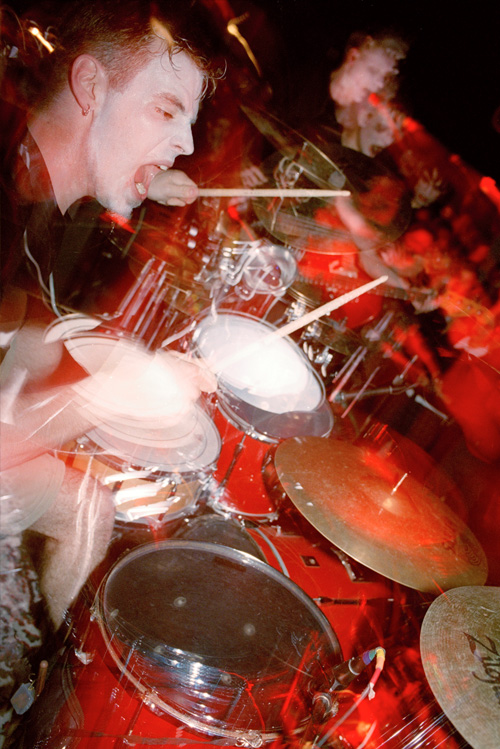
That album is so different, and Sean appears less on it, was it metamorphosis or chaos? As you were writing that album, did you know you were writing the last Ink & Dagger album?
A little bit. I was really close with Sean, and I was definitely in protest a little bit to some of the developing behaviors going on. I really wanted to work incredibly hard and press on with our things, but Sean was going through a bit of a change. He was always my best friend, it was always cool, but something was going on. I was already playing with a couple of other people, and ultimately I moved to Sweden for a second, which was also me having a bit of personal protest to him. It was making the point that things were bugging me to the point where, like, I’ll bail.
So, there was tension during the making of that album?
Whenever you have people around, especially loved ones, and you wish their behavior was a little different, that’s where true frustration can really lie. You start trying things, you start making points to them through other means. There was always a healthy tension [between us] just by pushing each other in a really cool and healthy way, but [at that time] I was really pre-concerned about the inevitable thing that happened anyway with Sean’s passing. It was already something I was really concerned about.
So it wasn’t inconceivable to you the way things happened then?
No, it was, it really was inconceivable to me, just maybe less.
Both you and Sean were burning bright and hot and fast, and you were both authentic and chaotic in equal measure. Is that something you ever thought could last? Or did you feel like before the release of that last album that you were done and you knew the crash was coming? Or did it come as a shock?
If Sean didn’t pass, there is no question we would have played more. There would have been no way to keep us from it. Sean was only fucking 27 when he passed away, and [he was] taking the time to go through things you’d go through in any life, and working through things, and just the trajectory of things led down a couple of avenues that couldn’t be returned from. He was an incredible, hard motherfucker. No matter what he was doing [he] was going to be pushing some envelope. There’s something baked into that that makes it intrinsically harder for someone like that, also.
If he didn’t pass, would we have done things in the future? Yeah, we probably had four more records in us. Something like that. I couldn’t imagine not. Who knows what would have evolved? But, at the time, we were in a sort of lull where we were trying to figure [things] out, having our moments on a friend level.
Was it shocking? Yes. I’m still shocked. We all deal with things in different ways, but he’s had such an incredible voice to honor and reflect on. And most importantly, [he’s still] involved in our current every day lives. I don’t do nostalgia, I do living today. It’s really easy to feel that way with this situation. We have as many trying, often more trying things, going on in our modern lives. If anything, we need this [now] more than ever, but not just to reflect on [it] as something cool from the past, it’s never left my DNA. It’s in all the things I do. And I’ve had other people, too, voice the same things to me. It’s so positive to have that as a background, as opposed to so many things that come and go.
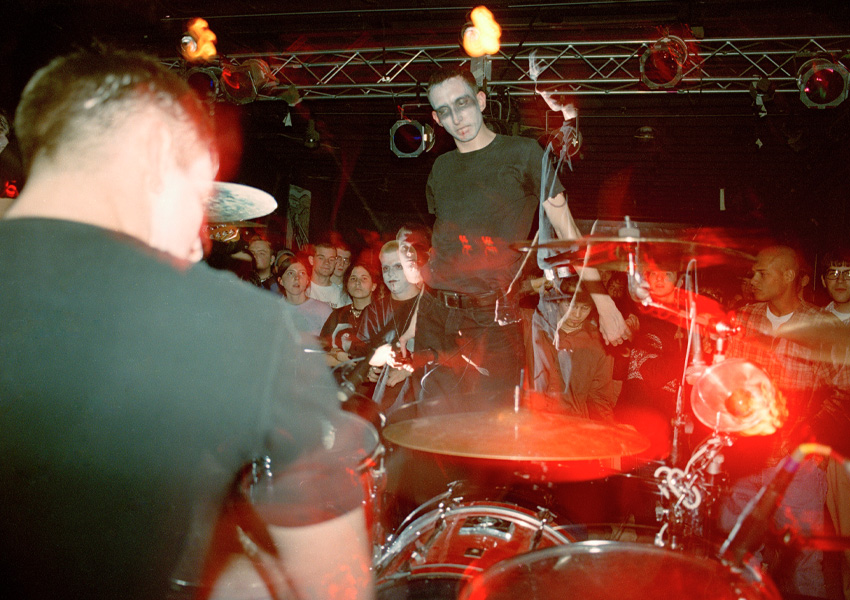
It’s been 25 years since the last album and Sean’s passing, what made now the right time to reissue the albums and play these shows?
My friend Evan [Weiss], who is Ink & Dagger’s manager and also a really accomplished musician in his own right, has been really instrumental in [helping] me being more comfortable with the idea. For the last 25 years, the community has just had this. From bootlegs, to the fact that I’ve never registered any of the songs. Who knows who was getting what where, it was just [out there] for the community basically.
A couple of years ago when I got involved with Trust, I felt, for a fact, at this point it’s okay to take control of it on a sort of anthropological level and make sure it’s represented properly, and [that] it’s okay for me to own the fact that I wrote these songs, regardless of the fact that it’s been so hard to comprehend a future that doesn’t include (the physical) Sean.
I knew that to do this properly it was going to take the right situation where I could do the billboard and have this crazy box set, have it represented the way it needed to be. Thank goodness I did wait, because there’ve been dozens of labels through the years that have been interested, it just never made sense and I wasn’t quite in the right headspace.
Now, it’s a very authentic, beautiful thing where everybody involved, from top to bottom, is one hundred percent in it. I’m just a guy who’s playing the guitar for everybody else, the ego and the self is taken so much out of it when you’re so humbled by a community that comes out and says ,“I need this, probably even more than you do.” That’s such a beautiful thing. The lack of cynicism, what we’re doing is being presented in a way that couldn’t be more authentic. Everyone involved has been training for the last six months for this. I’m kind of notorious for my rehearsal agenda and expectations, and everyone is fully in It and amazing, and we’re going to fuck that place up. I hope to get as inspired as everybody else. There’s going to be a lot of novel things there, we’re going to great lengths, and it really is this sort of full circle moment.
How did you connect with Trust?
I was super into the sort of anthropological look [Trust has been curating with bands] like Circle Jerks, SSD, Youth Brigade, all of this seminal shit having a proper home that is also entered into Library of Congress. The normal ethos of culture kind of gets looked over by the punk world. I really like that the first thing [Trust is] repping that isn’t some seminal shit from like 1979 is Ink & Dagger from the mid 90s.
I needed to do it properly, [to pay] a particular type of respect, and it all came together, but the process has been insane. There’s a 226 page book, four albums, everything painstakingly remastered. The book isn’t like a coffee table book with captions. Erik Bader, a writer from Philly, wrote it. It’s a couple of hundred pages of text. There’s no [outside] quotes in the whole thing in order to keep Sean’s voice proportionate. We wanted to keep it anthropological without being nostalgic. It can be current, as well.
It’s been a slow process but at the end of the day, an incredible amount of work has been done. Having people scanning shit all over the world, chasing shit down, keeping it a secret. I was pretty hard about that with people, we were really good about it.
Why now? In the current era it’s just the time that makes sense. We started planning this a couple of years ago. It’s a wild thing for me, because there’s various eras of the band, so how do you represent it properly through all eras? I think I have that in a good spot right now.
That brings me to the question, who’s playing the shows? Are you going to announce the (Ink & Dagger) line up or is it a surprise?
It’s everybody, all the people. I’m just the vehicle, the guitar. There’s four people involved who aren’t playing instruments.
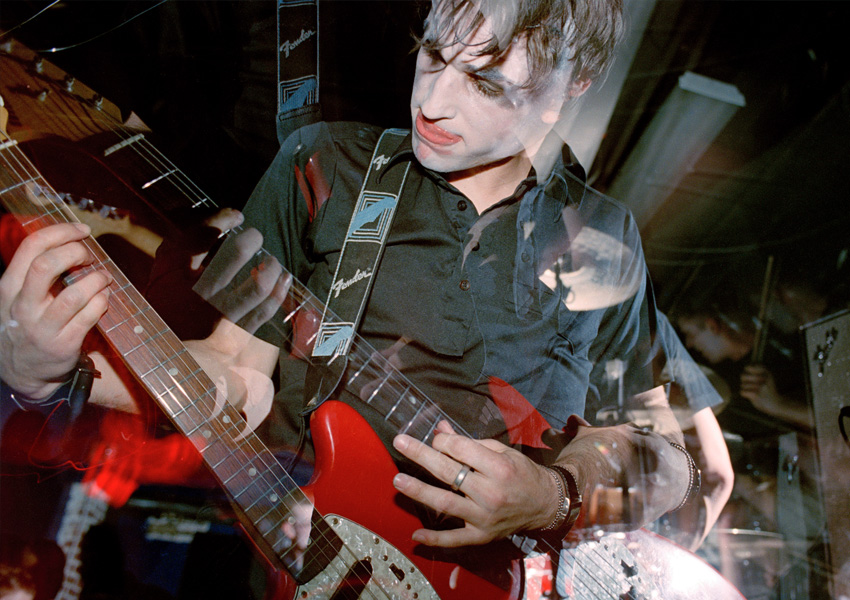
You haven’t announced who the vocalist is for the shows, are we going to be surprised?
Maybe. It makes perfect sense to me. It’s actually evolved, it’s changed a couple of times. Obviously everyone wants to know that, and I usually just say, “nice try.” It’s kind of like when, as soon as you start doing things, people are hitting me with, “Are you coming to New York? Are you playing any more shows?”
Well that’s another good question, do you have plans for more shows?
I have completely banished all talk or energy connected to anything past November 2nd. We have no room for speculation. We have to be 100 percent and focused on what we’re doing, and [we] can’t let anything pull from that. That’s just what it takes.
Are you open to more after this?
I’m open to anything in life, but as far as that goes, I can’t really even process thinking about it right now because there’s so much more work to do and so many things that need to happen. Anything taking away from that has to be limited. So, premeditating that was going to be a thing, is why this mindset was established. It’s not going to change anything. All we have to do is slay at these shows and deliver for the community and for the lineage, and we’re going to do that.
At this point it seems silly to consider anything else beyond these [shows]. It’s for Philadelphia, it’s for our community as much as it’s for anyone individually including me or anyone else in the band.
The whole week is called “The Philadelphia Society of Future Vampires Presents The Order.” The Order is the three shows that have been announced but there are various other things going on, including a reading from the book [included with the box set] at Launderette Records on Saturday [November 1st].
Philadelphia has a mural and arts program that’s really diverse and rich, it’s famous for it. We’ve found a wall and we have their support and there’s going to be a Sean McCabe mural. That will be done by ESPO, otherwise known as Steve Powers. It’s one thing to have some shows, but I like the idea of a non-bluffable city-sponsored mural. There’s Dr. J and Malcolm X, and Sean’s going to have a place in that echelon, as well. There are other things going on, as well, all of the surprises are nowhere near done.
There’s a respect and a focus to The Order and this week of events that is one hundred percent. It’s not preparing for something else. It’s not testing the waters. It’s here and now.
The city of Philadelphia is notorious for being chaotic, creative, and unapologetic, with a definite dark side, much like Ink & Dagger itself. How do you feel Philadelphia informed and influenced the band?
So much. The book really goes into hundreds of years of history regarding that same feeling. There’s a certain hustle and chaos that come together [in Philadelphia], and we were always big proponents of the [idea that the] more you can let where you are physically seep into who you are, the more authentic [everything becomes] to where you are and how you can use that energy.
Living in a little alley way a couple of blocks from the Church ,with skyscrapers all around you, mixed with the Liberty Bell… Philly is really checkerboard, you’ll have a strange street next to a beautiful street next to protected colonial sites, whether it’s the first post office or Ben Franklin’s house. It definitely adds to the energy of free thinking, creativity, struggle, there’s an element of fear, and with that comes excitement and passion, in a way. [Ink & Dagger] couldn’t be more tied in [with Philadelphia as a city], actually. There’s a deep connection to the gothic, traditional underbelly of Philadelphia, how you feel just walking around [the city]. Our City Hall couldn’t look scarier. It’s all interwoven.
One of my favorite things about Ink & Dagger is how much we were able to tie in to exactly where we were and presenting it in a way and being outwardly proud [of where we were from]. Like, Drive this 7” Stake Through My Philadelphia Heart – besides being a fucking mouthful for a title of a 7”, that really says it. I’ve never not repped Philly in the hardest ways I know how to.
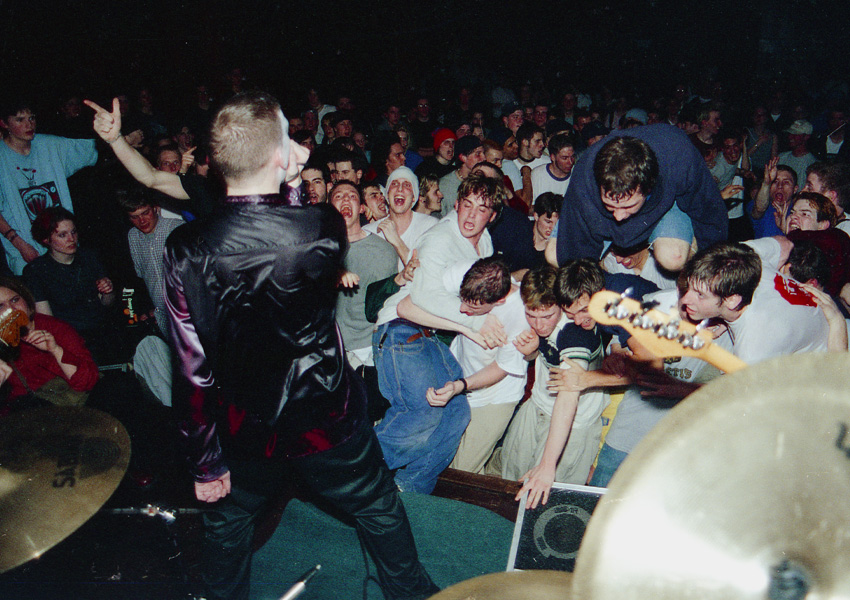
There are so many Ink & Dagger stories and it seems like everyone has their favorite. What is the Ink & Dagger story that you tell? What moments do you think of?
There’s all the hi-jinx and the wild stuff, but I think more about being in Stockholm and going to a Drum and Bass party and how Sean would dance. I think about letters. Say Sean was interested in some girl, he might make a 25 page zine, one of one, just for her, and spend a couple of days writing it. He always did mad drafts of things. Lyrics. Explanations of lyrics. You’d see three or four drafts, where it’s physically written page drafts. I always really loved that.
[I think of] these relationships we built all over the world with people, and for as antagonistic and provocative as Sean could be, he was also notorious for [meeting people.] We could be at a show and…[we’d wonder], “where’s Sean?” And for like a half an hour he would take just the bass player or guitar player from one of the bands and he’s in the hallway giving them an inspirational pep talk. I would say maybe he doesn’t blink once in that half hour, it’s so intense. I still hear about these stories where people will say, “You know, no one ever knew this, but Sean was the reason I started my construction business,” or some other thing. It goes so far beyond, “I was inspired by punk,” and into real life shit.
[I think about] confidence. Sean was easily the most confident person I have ever met, and it came through in all of these ways. It seeped out of him, so if you were even around it you got something out of it. That’s what I think of.
As far as hi-jinx go, there’s one [story] I always thought was hilarious and wonderful. We used to always play this venue, The Velvet Elvis, in Seattle, and it was all about this [actual] velvet Elvis as you walked in. So, one time we played we stole THE velvet Elvis. We had it on tour with us, holding it hostage.
Did you ever get it back to them? What happened to Elvis?
It wound up hanging in our house as an heirloom. It was too bold to be meta though.
If we played your show and the promoter stole the money, and we were in the middle of nowhere and we were gonna die [if we didn’t get paid], yeah, we might have stolen the promoter’s PA or something and sold it at a pawn shop. But there’s a lot of unjust stories I’ve heard that are so off brand and just not us. Some of them have really developed into other things that….if there’s no point behind it, it wasn’t us. It wasn’t like just some silly stupid shit [we were doing.] I’ve heard one about burning a Christmas tree or something? That one makes no sense to me.
Do you hear a lot of legends about the band that aren’t exactly rooted in truth?
I mostly hear inspirational things from people that were closer, like “you never knew that Sean mailed me this four page letter and that’s why I [have the life I do] right now,” or something huge like that.
This was like early internet/barely internet [time], and Sean would still have his network of people that would come meet him in any city and it would blow our minds. We’d be like, how does that person know him in Minneapolis or Vancouver or Tucson or wherever? How did he pregame this? It was fascinating.
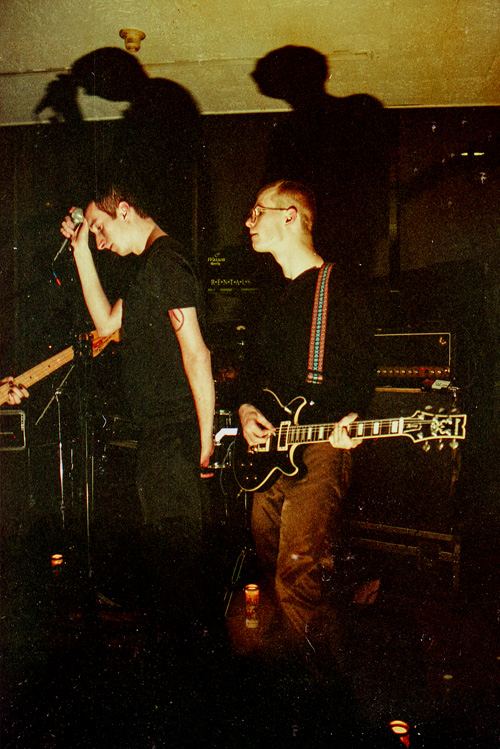
Sean truly sounds like he was in this for the connection, and that he was magnetic himself.
That’s the whole feeding part of the metaphor. If I meet you, and I inspire you, I almost get more out of it than you do.
A lot of people perceive the vampire element as dark, but it’s not?
No, it’s like sucking the energy out of someone, but they’re left renewed. We’d jokingly say, “Sean’s over there biting on someone,” it just meant he’s literally totally focused on someone. We weren’t tough in any sense, but if you have a certain confidence it alludes to all sorts of things that fall in the realm of a positive way to move forward. Even if it’s not [necessarily] delightful. It’s forward movement realization, energy, and feeling comfortable to self realize. Years later, I like to think that people [now] feel more innately [able] to self realize. They’re much more likely to mobilize themselves, whereas this had to be fought for. This had to be etched into the ethos or our country and our world. And it wasn’t free.
Do you feel like being a Philadelphian, being from the birthplace of American freedom, that’s something that’s inherently within you? That it’s built in?
Absolutely, and that’s what I hope to remind everyone of, too, from there, and not from there. It’s for everybody, how you get there, your vehicle…mine is a guitar and production ideas and authentic belief, but I wouldn’t even dare to tell you what yours is, that would be irresponsible. It’s up to you to find it. You can’t tell people shit, they have to self realize. The question is, how do you inspire people to self realize?
By the way, I’m still doing it. I look forward to the next twenty years of making music more than the last 20 years, easy. It’s a process that hopefully never ends.
What would your message be to someone now who’s getting into art or punk or music as someone who’s been through so much?
For as much as people quote Picasso, “good artists borrow, great artists steal,” that energy is as important as finding something that is your authentic output that you look forward to progressing. [To me,] that is the real goal. Not financial, not spiritual in a traditional sense, it’s to feel inspired. So having little techniques and ways to help yourself along as you learn more about yourself is a really big deal.
Be really careful to not get yourself stuck, and keep moving. That’s my plight currently, let alone then.
Past that, it’s almost irresponsible to tell anybody anything, besides the various “Future Vampire” concepts, which can be applied to anyone no matter what headspace you’re in, I don’t want to tell anybody anything about how to do anything, I want them to self realize, because that will have the power of length and it will have legs, it will mean something way more. You have to find it yourself. You can go looking for it, but you have to find it yourself.
Authentic things resonate with people beyond any algorithm, beyond anything that we can even put into a program or code or cipher. Finding that is powerful. Going to shows and zines and records, that’s all a part of it, but let’s be honest, we’re on a trajectory of a [whole] life as an artist, it’s not just a moment in time, so be careful about nostalgia. The Experiments In Nocturnal Sounds and Energy, that was us, trying to find our voice.
It comes in increments. You might not have an “a ha” moment, this is a slow burn, hopefully. You start piecing together what it is that ultimately becomes what you do, and along the way you start to build.
All that being said, but I am proportionately into the fact that there are no rules and I can’t fucking wait for someone to blow my mind with some novel shit I didn’t think of, which is coming. I get inspired by shit that is just like, where did that come from?
Is there anything we missed that you want to talk about or want to get out there?
Well, we haven’t confirmed the fact that you’re going to come to Philly [to cover the shows], but I’d really like to. (laughter)
Postscript note from the editor: I can confirm that Today Forever will be in Philadelphia to witness The Order. Look out for a recap of the week here soon. Devil children unite. <3
View this post on Instagram

